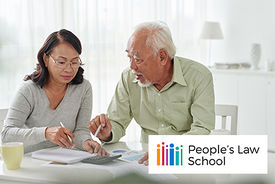Introduction to Wills and Estates Collection: Difference between revisions
Drew Jackson (talk | contribs) |
Drew Jackson (talk | contribs) |
||
| Line 11: | Line 11: | ||
[[File:Creativecommonssmall.png|link=Clicklaw Wikibooks Copyright Guide|alt=Creative Commons Attribution-NonCommercial-ShareAlike 2.5 Canada Licence]] ''Wills and Estates Collection'' © People’s Law School is, except for the images, licensed under a Creative Commons [[Clicklaw Wikibooks Copyright Guide|Attribution-NonCommercial-ShareAlike 2.5 Canada Licence]]. | [[File:Creativecommonssmall.png|link=Clicklaw Wikibooks Copyright Guide|alt=Creative Commons Attribution-NonCommercial-ShareAlike 2.5 Canada Licence]] ''Wills and Estates Collection'' © People’s Law School is, except for the images, licensed under a Creative Commons [[Clicklaw Wikibooks Copyright Guide|Attribution-NonCommercial-ShareAlike 2.5 Canada Licence]]. | ||
At [[People's Law School]], we believe accurate, plain English information can help people take action to work out their legal problems. This resource explains in a general way the law that applies in British Columbia. It is not intended as legal advice. For help with a specific legal problem, contact a legal professional. Some sources of legal help are highlighted in the "Where to Get Help" sections. | At [[People's Law School]], we believe accurate, plain English information can help people take action to work out their legal problems. This resource explains in a general way the law that applies in British Columbia. '''It is not intended as legal advice.''' For help with a specific legal problem, contact a legal professional. Some sources of legal help are highlighted in the "Where to Get Help" sections. | ||
== About People's Law School == | == About People's Law School == | ||
Revision as of 21:34, 9 March 2017

The Wills and Estates Collection brings together four titles from People's Law School on planning for aging and dealing with death:
- Writing Your Will is for people who are making a will in British Columbia. It explains what is involved in making a will, what to consider in appointing an executor, and what to do after making your will.
- Power of Attorney tells you how a power of attorney can be used to give someone the legal power to take care of financial and legal matters for you. It explains the types of power of attorney, who can be an attorney, what powers and responsibilities the attorney has, and how to end a power of attorney.
- A Death in Your Family is for people who want to know what to do when a loved one dies. It covers preparing for the death of a loved one, what to do immediately after the death, making the funeral arrangements, and where to find support.
- Being an Executor is for people who have been appointed as executor in a will. It covers the steps involved in British Columbia in dealing with an estate after a person dies, including the procedure to probate the will.
The information reflects the Wills, Estates and Succession Act, which became law in 2014.
Copyright & Disclaimer
![]() Wills and Estates Collection © People’s Law School is, except for the images, licensed under a Creative Commons Attribution-NonCommercial-ShareAlike 2.5 Canada Licence.
Wills and Estates Collection © People’s Law School is, except for the images, licensed under a Creative Commons Attribution-NonCommercial-ShareAlike 2.5 Canada Licence.
At People's Law School, we believe accurate, plain English information can help people take action to work out their legal problems. This resource explains in a general way the law that applies in British Columbia. It is not intended as legal advice. For help with a specific legal problem, contact a legal professional. Some sources of legal help are highlighted in the "Where to Get Help" sections.
About People's Law School
People's Law School is a non-profit society in British Columbia, dedicated to making the law accessible to everyone. We provide free education and information to help people effectively deal with the legal problems of daily life.